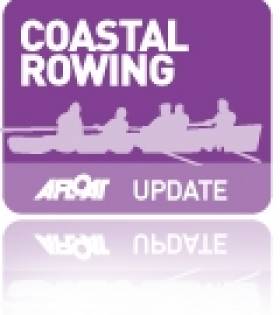Displaying items by tag: Irish Coastal Rowing
#Rowing: Whitegate Rowing Club are delighted to have been selected to host the 2019 Irish Coastal Rowing Championships. This event is one of the largest rowing regattas in Ireland and it is an honour for the club to have been nominated as this year’s host club.
The event will take place on the weekend of August 23rd and 24th and it will be held at the National Rowing Centre, Farran Woods.
The committee of Whitegate Rowing Club cordially invites our local community, club supporters and anyone who simply loves sports to the launch of their hosting of the Irish Coastal Rowing Championships at their cubhouse in Whitegate, Co. Cork on Saturday, April 20th at 6.30 pm.
This launch event coincides with a club open day, where those interested in taking park in the sport are more than welcome to come along and find out what it is all about! The open day runs from 5.30 pm to 7.00 pm and light refreshments will be served
Club Chairperson Rachel Barry said: “Coastal rowing is a fantastic sport and our members range from junior rowers of 10 years, right up to our Masters members (over 55) with incredible experience. We work hard to promote the sport of coastal rowing and are extremely proud of our club’s ethos of inclusion and strong sportsmanship. To be selected to host this year’s Championships is a huge honour and a matter of pride for our local community.”
Whitegate Rowing Club is one of east Cork’s premier coastal rowing venues. The club have been rowing out of their base at the Sawmills in Whitegate since 1991. The club are now looking forward to hosting their third All Ireland Coastal Rowing Championships and have a reputation as a strong and successful club in the sport of coastal rowing.
WRC’s mission is simple: to train and instruct members in the sport of Coastal Rowing. The club strives to foster, promote and develop the sport and create a positive and encouraging environment for all.
Killorglin Rowing Club Excel at Irish Coastal Rowing Championships
#COASTAL ROWING: Killorglin won the final event of the day, the men’s four, at an Irish Coastal Rowing Championships which were blessed by good conditions at Lough Currane, Waterville, County Kerry. The blue riband event had gone to Cork clubs for the last four years, but Killorglin’s crew of Cathal Clifford, Cian Clifford, Seán Deignan and stroke Fionnán Crowley brought it back to the host county. Killorglin’s women’s four – stroked by Aileen Crowley – also won.
The award for Sporting Club of the Day went to Carnlough of Antrim, while Ring from Cork had taken the title of best overall junior club, and Cairndhu the best adult club.
Irish Coastal Rowing Championships, Waterville, Kerry (Selected Results, Finals Winners)
Men
Senior: Killorglin. Intermediate: Caherciveen. Junior: Ring. Under-21: Whitegate. Under-18: Passage West. Under-16: Killorglin.
Veterans: Portmagee. Pre-Vet: Fossa.
Women
Senior: Killorglin. Intermediate: Passage West. Junior: Galley Flash.
Under-21: Killorglin. Under-18: Sneem. Under-16: Kilmacsimon.
Veterans: Myross. Pre-Vet: Arklow.
Mixed
Senior: Killorglin. Veterans: Portmagee. Pre-Vet: Portmagee.






























































